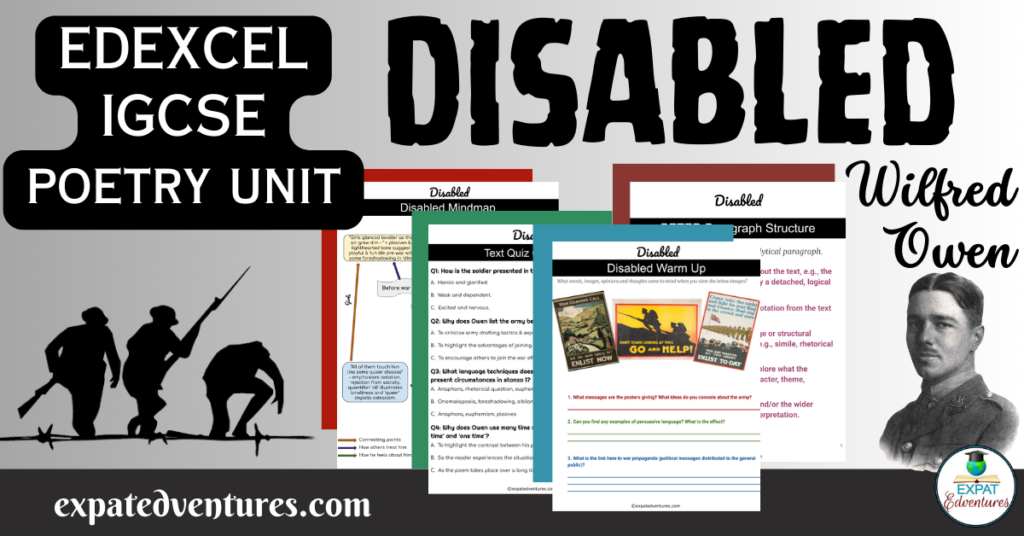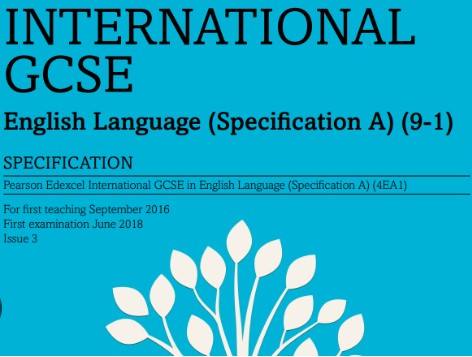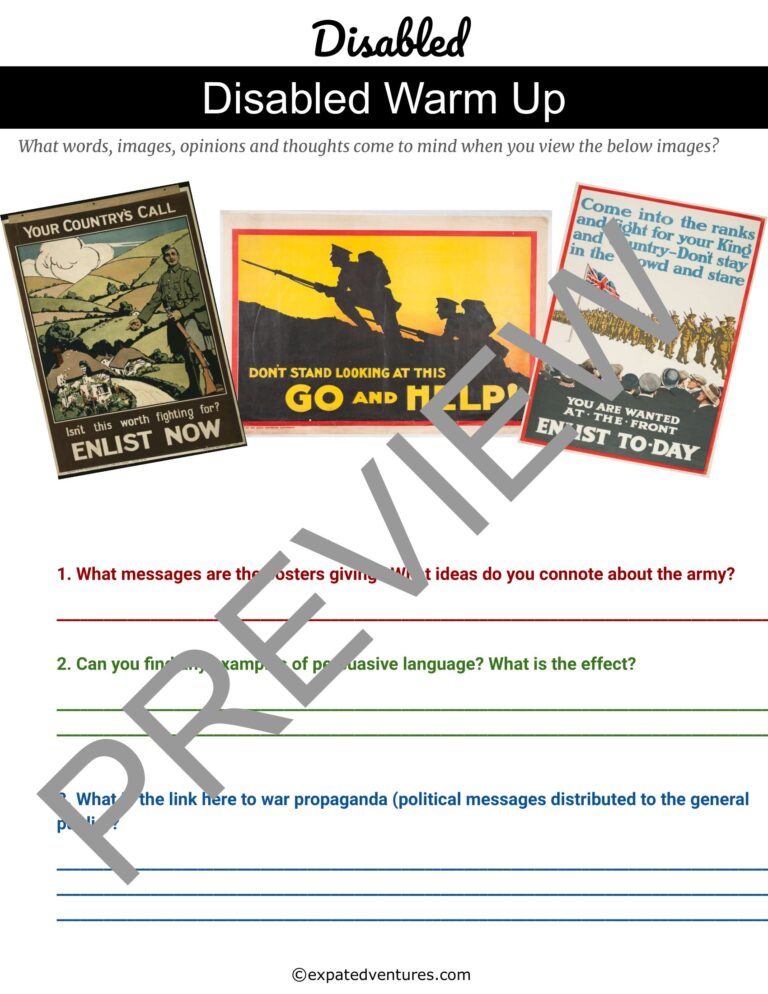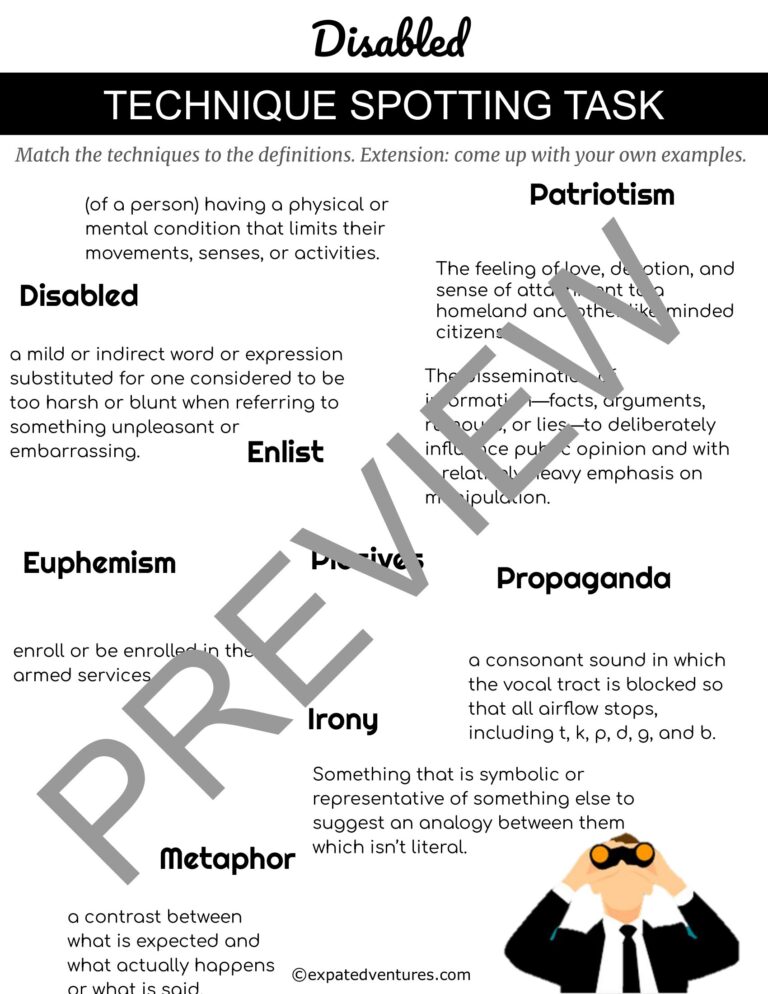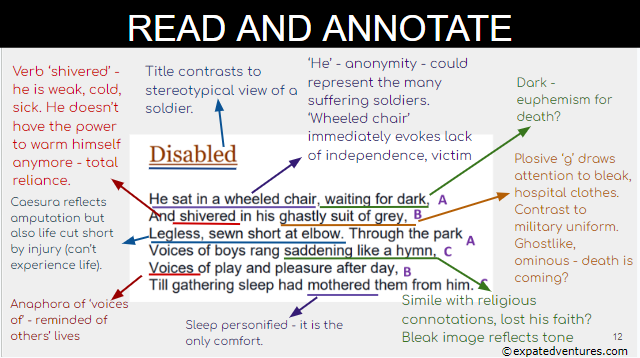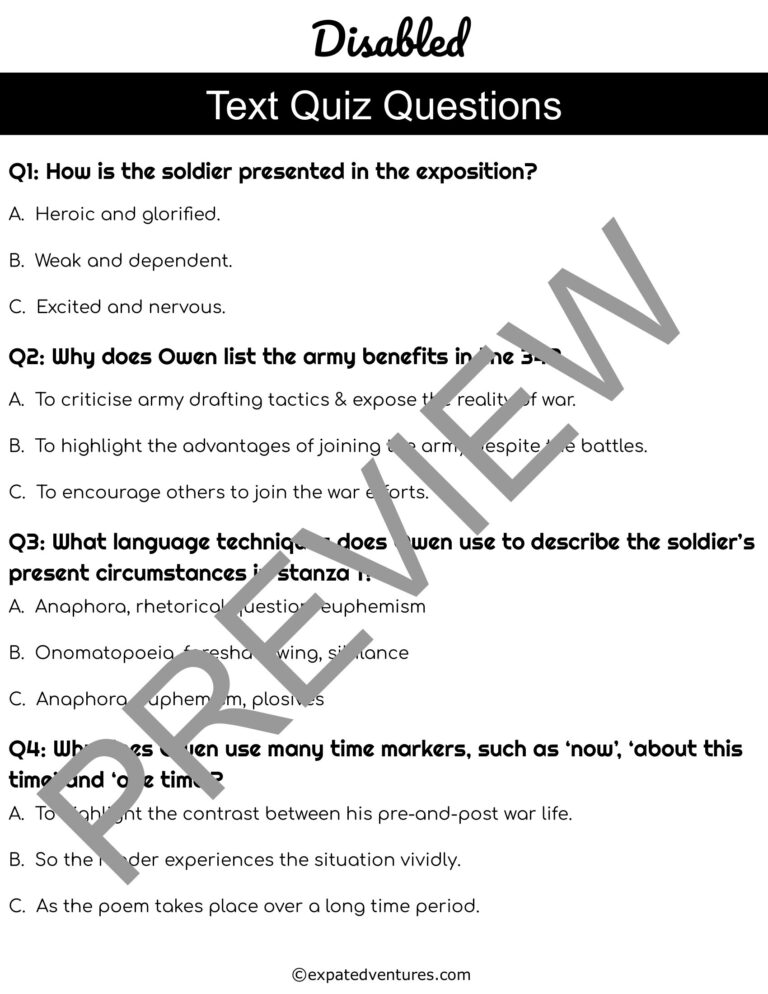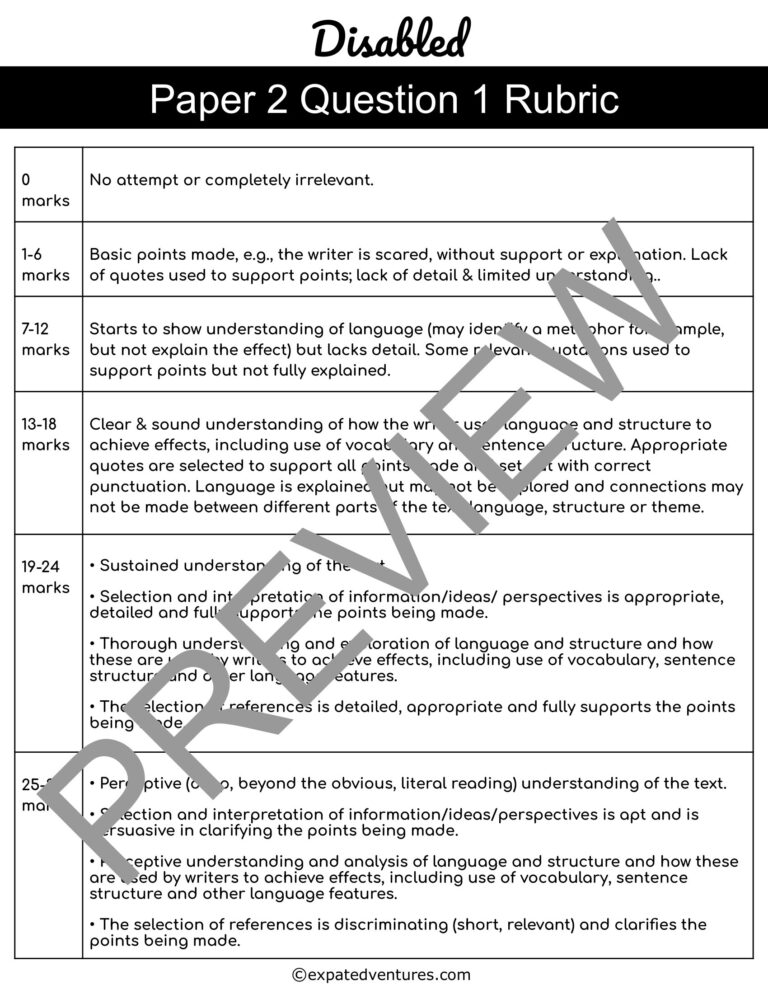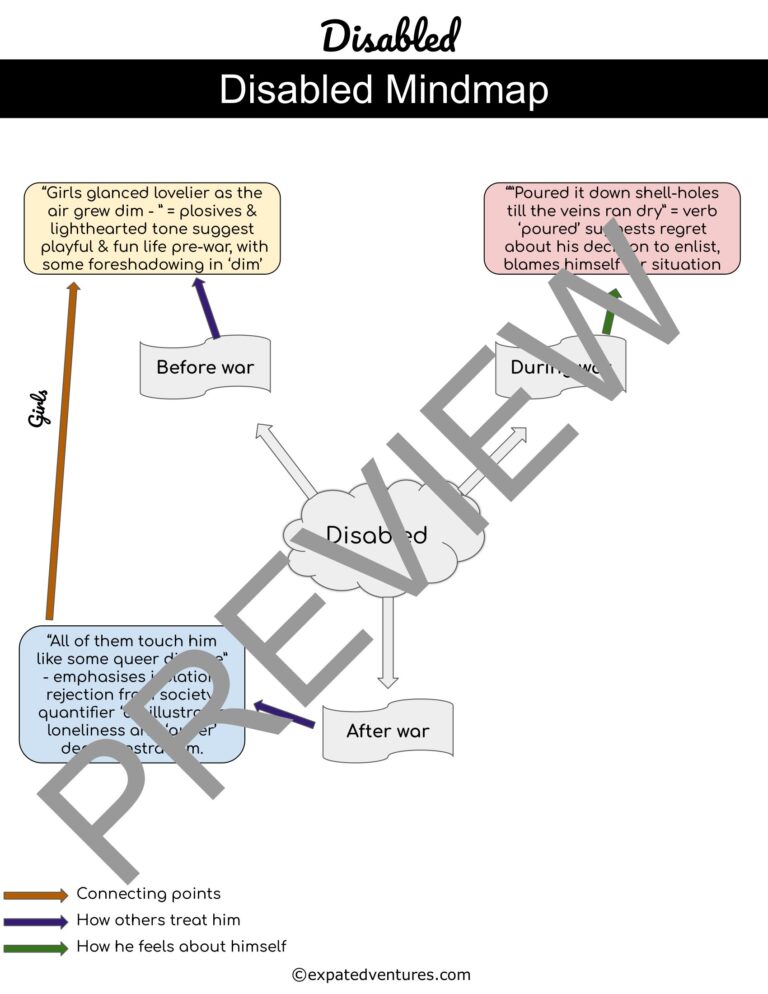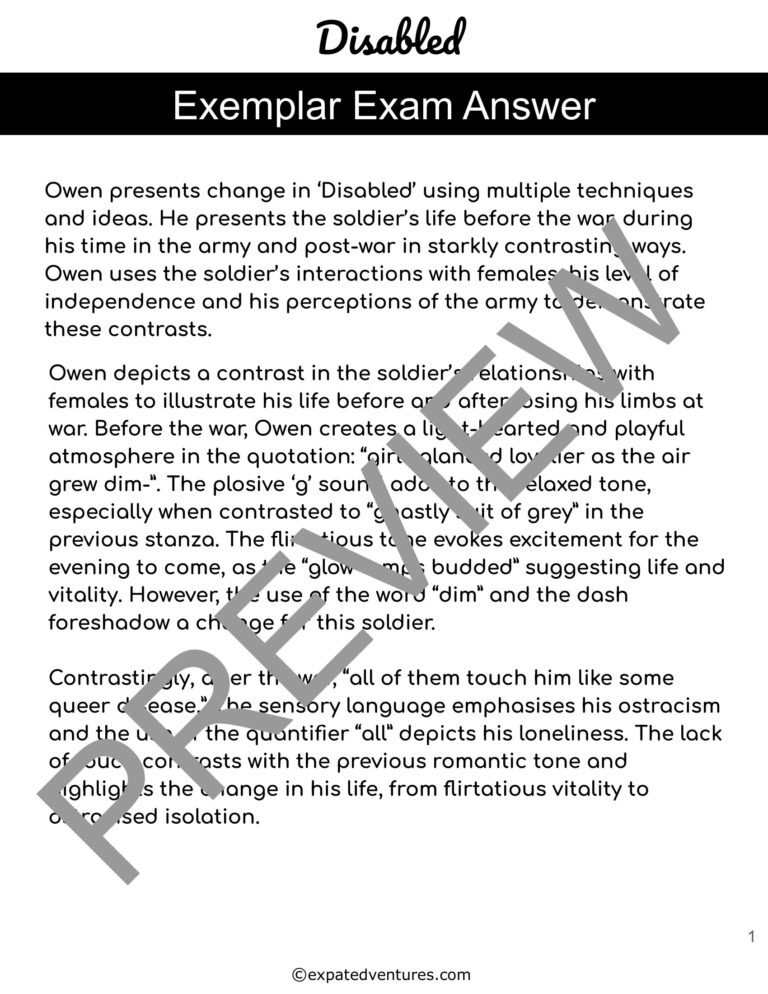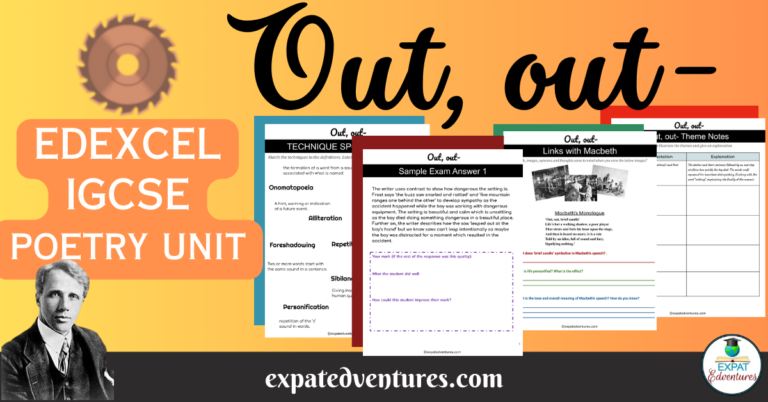The poem ‘Disabled’ by Wilfred Owen is currently taught on the Edexcel GCSE/IGCSE English Language Paper 2 curriculum. It is one of the 10 prose and poetry anthology texts which students answer on for Question 1. This complete ‘Disabled‘ by Wilfred Owen IGCSE analysis comes in a cohesive poetry unit. It includes a line-by-line annotated text, quiz questions with an answer key, a mind mapping planning activity, rubric and exemplar full mark answer.
‘Disabled’ by Wildred Owen tells the harrowing tale of a young man injured whilst fighting in World War One. Having his limbs amputated has left him reliant on others for his every need. Through various contrasts, Owen portrays this man’s life before the war as a partying, popular footballer to his bleak and depressing present circumstances. He criticises the army’s methods of enlisting teenage boys and gives a scathing message about the futility of war.
Owen uses irony to depict his critical message about war; but how can we support students to capture that in their exam essays? How can we break it down to consider not only the tragic story of one soldier, but the wider messages about military recruitment tactics?
‘Disabled’ by Wilfred Owen IGCSE Analysis in a Scheme of Work
I’ve created a scheme of work for busy teachers to take your students step-by-step through the poem. It contains everything from an engaging, thought-provoking starter, to identifying literary techniques, to analysing and annotating the poem, to practising the Question 1 30-marker. This resource contains editable Google slides, quizzes with answer keys, sample exam questions, example exam answers and close textual annotations of the whole GCSE poem. All activities are ready to download and print in PDF form or there are links for you to personalise them if you wish.
Edexcel IGCSE English Language Exam Paper 2
The 1 hour 30 minutes Edexcel IGCSE English Language Paper 2 exam is split into Section A and Section B. Section A is the reading assessment and candidates are presented with one of the 10 prose and poetry anthology texts. The prose texts are between 1.5 and 3.5 pages long and the poems are approximately 1 page. They have 1 30-mark question to answer, which is usually based on a broad theme from the selected text, such as death, strong emotions, sympathy or conflict. Candidates are provided with 3 bullet points which give guidance as to what to include in the response.
Section B is an imaginative writing assessment. Candidates choose between three options, which are normally loosely based on the Section A text.
- Question 2 tends to be a personal question. For example, write about a time you overcame a challenge. The response can be real or imagined.
- Question 3 tends to give the title of a story, and candidates are required to write the story.
- Question 4 usually provides a set of 2-3 images which students may use as a stimulus to write a story.
Edexcel ‘Disabled’ by Wilfred Owen Analysis and Resources
To introduce the poem ‘Disabled‘, I give students some World War One propaganda posters to look at in pairs or small groups. I ask them to consider the messages of the posters, who they are aimed at, and the persuasive techniques used. I then hold a quick class discussion to ascertain how much they know about the time period and propaganda. Next, I discuss the contrast between the reality of war and what is portrayed in the posters. Time-permitting and if students are interested, you could view some videos about war propaganda. You could set this as extension work or homework if you wish.
‘Disabled’ by Wilfred Owen IGCSE Literary Devices
Before diving into the text, I quickly review key language techniques in the poem so that they are fresh in students’ minds as they read. A matching activity is included in this resource. Students match the definition and technique, which they can either copy, cut and paste or simply number. As an extension, students can write their own examples of the techniques. There are also terms related to World War One with this unit, so that students can be specific in their analysis. Moreover, this is a useful revision tool for and any GCSE poetry exam. When they know the language techniques implicitly, they naturally refer to them in their analysis and their marks improve.
‘Disabled’ by Wilfred Owen IGCSE line-by-line analysis
Before close textual analysis, I often ask students to do an initial reading or simply listen to the poem for the tone and literal reading. It is a fairly straightforward poem for students to understand on a surface level – a description of a tragic war injury. The challenge comes in unpacking how Owen presents the contrast between pre-and-post war, the emphasis on the timeframe and the ironic criticism of the army’s recruitment tactics and propaganda.
When it comes to closely analysing the lines of the poem, there are a few ways of approaching the activity. You can read and annotate together with students completing the annotations in real time. Alternatively, you can split students into groups and ask each group to focus on a certain number of lines before feeding back to the class. Or you could read and discuss, then ask students to complete the annotations for homework.
There are many ways of approaching close textual analysis; I find that varying the method for different texts keeps students interested through the unit. For poems specifically, I tend to do annotations as a class activity as poetry can be more abstract and harder for students to grasp than prose texts. This ‘Disabled’ scheme of work contains detailed line-by-line annotations of the whole poem.
Edexcel ‘Disabled’ by Wilfred Owen IGCSE Quiz with Answer Key
After analysing the poem, I do a quick AFL quiz with students to assess their understanding of the language and structure of the poem, then introduce exam practice questions. Quiz questions for a straightforward low stakes multiple choice quiz with answers are available on the slides and in PDF form with this resource. Depending on your time and the nature of your class, you can do this as a whole class activity on the interactive whiteboard or hand out to students to do in pairs or individually.
‘Disabled’ by Wilfred Owen Edexcel Practice Exam Questions
Question 1 on the IGCSE English Language Paper 2 exam is a 30-mark question on one of the 10 anthology prose and poetry texts. You can find them in Part 2 of the anthology. Although it is 1 question, it is quite high stakes as students don’t have anywhere to hide; they must perform on this question. I reinforce to them that they must know all 10 of the texts very well to write a detailed essay on just one of them in the exam.
In this ‘Disabled’ by Wilfred Owen GCSE poetry unit, there is a rubric, paragraph structure and sorting activity so that students can see how to write a cohesive analytical paragraph. This is a useful way to ease hesitant students into writing a full analysis of the poem ‘Disabled’ by Wilfred Owen.
For the question 1 past paper prompt, firstly, take students through the rubric so that they familiarise themselves with how the response is awarded. Then, you can take students through the example PETER paragraph (point, evidence, technique, explain, refer). If you wish, you can ask them to order the parts of the example paragraph, so they grapple with the concept of a cohesive paragraph. This way, there are scaffolds in place to support students to produce high quality responses and you can demonstrate how the paragraph hits the mark scheme pointers, such as exploring techniques and use of vocabulary for effect. It also directly links to the question, which is something examiners look for.
‘Disabled’ by Wilfred Owen Analytical Mind Mapping Activity
Students often struggle to plan their ideas; they are left wondering; how do I start? What do I write and in what order? A mind map is a good tool for students to revise the texts, but also produce a cohesive analysis and plan out their ideas so that they avoid repetition.
I have included an example of a mind map in this ‘Disabled’ by Wilfred Owen poem analysis and GCSE unit of study. I split the poem into pre-war, during the war and post-war. Students can then make notes for each of these sections. Then, they can use colours, notes, diagrams or images (however their brain works) to connect and order their ideas.
Edexcel ‘Disabled’ by Wilfred Owen IGCSE Exemplar Analytical Essay
Included in this ‘Disabled‘ IGCSE poetry scheme of work, I have provided a full-mark example answer for the Question 1 30-marker. I find it the most effective to ask students to have a go at answering first, do some peer or teacher marking of their answers, then present them with the full-mark response. Often, I find if students achieve a mark they are unhappy with, they ask ‘what do I have to do to increase my mark?’ Or, they might say ‘how do I make it better?’ These are great questions as it shows engagement with the improvement process. This is when providing them with an exemplar analytical essay can help them ‘see’ exactly how to plug the gaps in their own response.
There are examiner’s comments in the notes section of the presentation about this response. Essentially, to be awarded full marks, there should be evidence of perceptive analysis. I explain to students that the answer goes beyond ‘obvious’ points and draws out the writer’s range of feelings and connection to the reader’s reaction. Consider whether the writer changes their perspective and how language and structure interconnect for effect. For example, a long syndetic list can also contain strong, emotive verbs. Quotations must be relevant to the points made for a student to fall in the top band of the mark scheme, and multiple quotations should be used through the response.
Edexcel GCSE English Language Imaginative Writing Practice
There are also a couple of creative activities included in this resource. Time-permitting, this is an excellent text to base a creative or transactional writing piece around. You could have the students write an article or a letter based on the text. This can help develop skills required for Section B of Paper 1 (Transactional Writing) and Section B of Paper 2 (Imaginative Writing), whilst increasing their engagement with the poem ‘Disabled’ by Wilfred Owen.
Edexcel GCSE Poetry Teaching, Learning and Revision
To sum up, some of the best techniques for teaching the 10 prose and poetry texts include:
- Hook students with an intriguing starter activity
- Use alternative methods to closely analyse and annotate the text
- Quiz students for quick AFL strategy to assess whether they are engaging with the text
- Practise past paper questions
- Study model answers, including examples of typical mistakes students make in the exam responses
- Offer an optional creative activity as homework or an extension to challenge students’ perceptions of the text
Good luck teaching ‘Disabled’ by Wilfred Owen. It’s a bleak, but eye-opening poem rich with literary devices that students can use in their exam responses. Comment below if you can add any useful teaching and learning techniques for this text.
Other Useful Edexcel IGCSE Resources
If you enjoyed this article about teaching ‘Disabled’, you might also find value in my Edexcel IGCSE Paper 2 guides and resources for ‘Out, out-‘. There are also Edexcel IGCSE English Language Paper 1 guides and schemes of work for many of the set texts, including The Danger of a Single Story and A Passage to Africa on the blog. Follow my store for more as resources are constantly being added.

